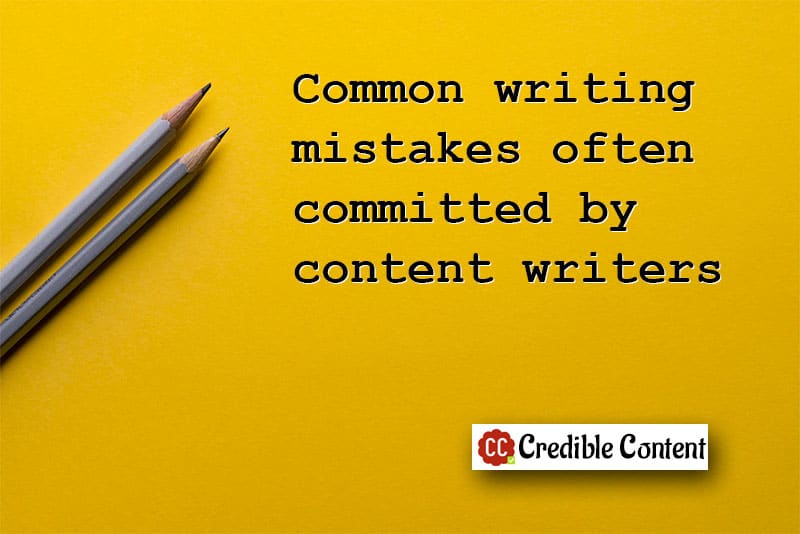A client sent me a website link to check out. The moment I loaded the link I could see at least three grammatical errors without even having to read a single paragraph.
Some writing mistakes are glaring, some are subtle and some are just a part of our habit.
Sometimes my writing also has mistakes and it is very embarrassing when they are pointed out by the client.
Fortunately, even when the client points out the errors, he or she knows that it is either an oversight on my part or it is just a part of my writing style. That’s a saving grace.
This blog post has some nice writing tips listing mistakes that even established writers and authors commit.
Some of these include
Wrongly using commas
Just because you are pausing doesn’t mean you have to use a comma. Use them sparingly.
I have this tendency to use commas, sometimes even before an and.
Long complicated sentences
Divide complex thoughts into smaller, simpler sentences. This is more important because most of your visitors will be accessing your website on their mobile phone.
Shorter sentences are easier to comprehend. They are easier to read. They make a stronger impact because every sentence carries a single thought.
Run-on sentences
I have never studied grammar properly. Hence, I needed to check what a run-on sentence is.
By definition, a run-on sentence is when two or more independent clauses (that can be termed as complete sentences) are included in a single sentence without a logical connection.
For example, “I love eating oranges I eat an apple everyday.”
These are two complete sentences in themselves. Either you write them separately or you use a conjunction, something like, “I love eating oranges but I eat an apple everyday,” or “Although I love eating oranges I eat an apple everyday.”
Passive voice
Using passive voice isn’t always bad but avoid it whenever you can.
For example, instead of writing “Passive voice should be avoided,” you can write “Avoid passive voice,” or “You should avoid passive voice.”
One drawback of using passive voice that I can see is that it unnecessarily injects extra words and phrases into a sentence.
Since it is “passive” it creates a disconnect. But when you use an active voice, you’re talking to your readers.
Lack of parallel structure when creating bullet points
When you’re creating bullet points, follow one grammatical structure.
For example, I can help you
- Write better content for your website.
- Improve your SEO
- Improve your conversion rate.
Or,
I can help you with
- Writing better content for your website.
- Improving your SEO.
- Improving your conversion rate.
Avoid using this
I can help you with
- Writing better content for your website.
- Improving your SEO
- Better conversion rate (<– this one)
Wrong word choice
Actually, for many years, I have not made such mistakes. But many people do. For example, using “loose” when you actually mean “lose”. Also, mixing “its” and “it’s” or “there” and “their”.
Sentence fragments
I sometimes use very small, fragmented sentences for an impact. You may also use fragmented sentences in poetry, but don’t overdo them.
For example: Through content writing. I can help you with many things. Improve your SEO. Better content for your website. Better conversion rate.
Although, structurally, there is nothing wrong in these sentences, some of them are not sentences but phrases.
Again, use them to create an effect, but don’t fill your entire write-up with such sentences. Fragmented sentences look good as bullet points though.
Vague pronoun references
In the above-linked blog post, the writer has given a good example: “When Jack found his cat, he was very happy.”
Although, you can assume that Jack was happy to find his cat, the sentence itself doesn’t make it clear whether it was Jack who was happy or the cat. I would rewrite the sentence like this, “Jack was very happy when he found his cat.” or “Jack was very happy to find his cat.”
Overused ellipses and em dashes
Elipses are the three dots – … – that you often use when you want to leave something midway.
Something like, “I would have completed your document today but I was…anyway, I will try to complete it tomorrow early morning.”
You use em dashes to put extra information in a sentence. Something like, “He wiped his feet vigourously before entering – he knew that in the afternoon his wife swept the floor – and as a result, he had twisted his ankle.”
There are uses of elipses and em dashed – that’s why they are there – but don’t overuse them otherwise they end up distracting the reader.
Improperly formatted quotations
Quotation marks have a meaning. Writers use them to write dialogues between different characters. They are also used when you don’t mean to use a word in the sense that it is often used.
For example, David often likes to call himself a “writer” but no one knows exactly what he writes.
Another example: He is the “champion of the poor” – it means, I don’t actually mean to call him the champion of the poor.
If you want to highlight a word or a phrase, use bold font instead.
Actually, off late I have been committing this mistake, especially when I’m linking to other blog posts; I enclose the title within quotations. I will avoid doing that now.
Do I use any special technique or process to proof read?
No, I don’t. In fact these days I’m not even using a proper word processor. I’m writing this using iA Writer and then straight away I will export the HTML into WordPress.
This doesn’t mean I’m careless about my writing. It’s just that, I have reached a stage when I can write without worrying about committing grammar mistakes. And the browser has a very decent spell checker.
I do give the write-up a thorough reading before sending the document to the client.

